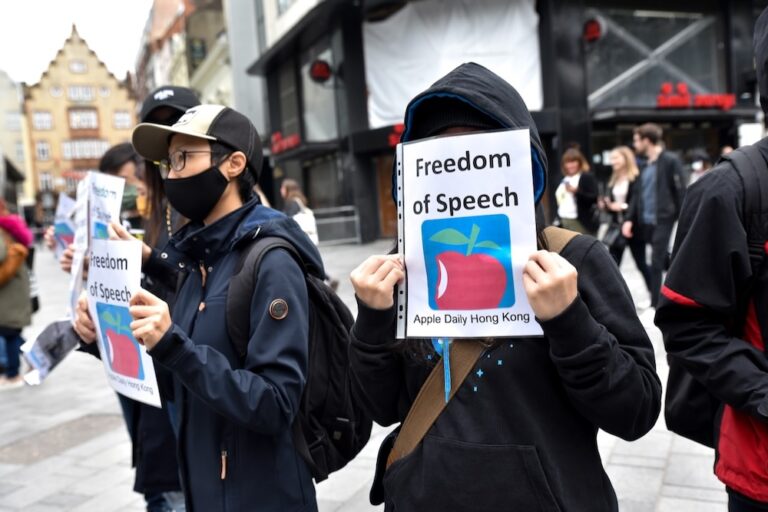(RSF/IFEX) – Eight countries (Bangladesh, Pakistan, India, Cameroon, Nigeria, Kenya, Sierra Leone and Zambia), all members of the Commonwealth due to attend the meeting in Edinburgh, Scotland from 24 to 27 October 1997, do not respect the freedom of the press, says RSF. Since the last meeting, held in Auckland in November 1995, ten journalists […]
(RSF/IFEX) – Eight countries (Bangladesh, Pakistan, India,
Cameroon, Nigeria, Kenya, Sierra Leone and Zambia), all members
of the Commonwealth due to attend the meeting in Edinburgh,
Scotland from 24 to 27 October 1997, do not respect the freedom
of the press, says RSF. Since the last meeting, held in Auckland
in November 1995, ten journalists have been killed in
Commonwealth countries (Bangladesh, India, Pakistan and Sierra
Leone) and fifty-one have been jailed. More than a hundred have
been assaulted.
In the past two years, four media workers have been killed by
separatist groups in India. Sydan Shafi, journalist with the
Indian state television Doordashan, was shot dead on 16 March
1997, after being threatened by a separatist group from Kashmir.
In Pakistan, separatist, religious or political groups are also
suspected of killing three journalists. In these three unsolved
cases, the authorities do not seem willing to investigate. In
Sierra Leone, on 3 June, Ishmael Jalloh, a freelance journalist
working for the private newspapers “Punch”, “Storm” and “Vision”,
was killed by a rocket while he was covering fighting between the
Sierra Leone army and the Nigerian troops of the ECOMOG, the West
African peace keeping force. In Bangladesh, during the general
elections, two journalists were shot by police forces or
political activists.
According to RSF, 51 journalists have been imprisoned during the
past two years in some Commonwealth countries: Bangladesh (4),
Pakistan (3), Cameroon (10), Sierra Leone (11) and Nigeria (23).
In Zambia and Kenya, the private press has been subjected to
harassment: three Zambian journalists, favourite government
targets, were arrested several times in 1996 and 1997. Meanwhile,
the government of President Daniel Arap Moi increased the number
of those detained for questioning in Kenya. On 20 October 1997,
five journalists were still in jail in Nigeria. Four of them were
sentenced to 15 years in prison, convicted of “concealing
information and involvement to varying degrees in the failed coup
d’etat.”
In Bangladesh and in Pakistan, journalists are regularly victims
of violence. During the last two years, more than a hundred media
workers in Bangladesh have been assaulted or threatened,
especially during the 1996 general elections. In Pakistan,
newspapers premises are targeted by police, local key figures or
extremist groups. On 24 April 1996, a group of about ten armed
and hooded men attacked the premises of “Mashriq” a newspaper in
Baluchistan province. They assaulted journalists, injuring two,
and damaged computers and office equipment. The newspaper blamed
the Federation of Moslem Students, an organisation often accused
of being responsible for violence. Other sources said the attack
was carried out by militants of an opposition party, the Pakistan
Moslem League. On 4 March 1997, the premises of the newspaper
Jang were the target of a bomb attack that destroyed equipment
but caused no casualties. The day before, the offices of “Qaumi
Akhbar” were attacked. In 1997, two journalists from Cameroon and
Nigeria were tortured by police. During the summer of 1997 in
Kenya, police seriously injured six journalists while they were
covering public demonstrations. In Sierra Leone, nine journalists
under threat, were forced to go into hiding.
The year 1997 provided several examples of more or less
successful attempts to make media laws tougher. In Zambia, in
March, the government proposed a law setting up a Media Council
to “discipline” the private sector of the press. It was the
subject of major controversy before being “temporarily suspended”
by the authorities. In Sierra Leone, the junta attempted to
restore a press law setting the conditions of registration. The
Minister of Information has full powers to accept or reject
publication requests. The abolition of official censorship at the
start of 1996 was a step forward for press freedom in Cameroon,
but after two years, official censorship turned to be
self-censorship.
Because of the mass infringements of freedom of the press in
Nigeria, Reporters sans frontieres asks the governments of the
Commonwealth to maintain the suspension of Nigeria as long as
General Sani Abacha does not put an end to the harassment of the
private press and does not release the five journalists presently
detained. Reporters sans frontieres also asks for the extension
of the sanctions taken against Sierra Leone until threats against
journalists stop. The organisation urges the Commonwealth
countries to respect and to enforce the International Covenant on
Civil and Political Rights, article 19 of which guarantees the
freedom to inform and to be informed.


